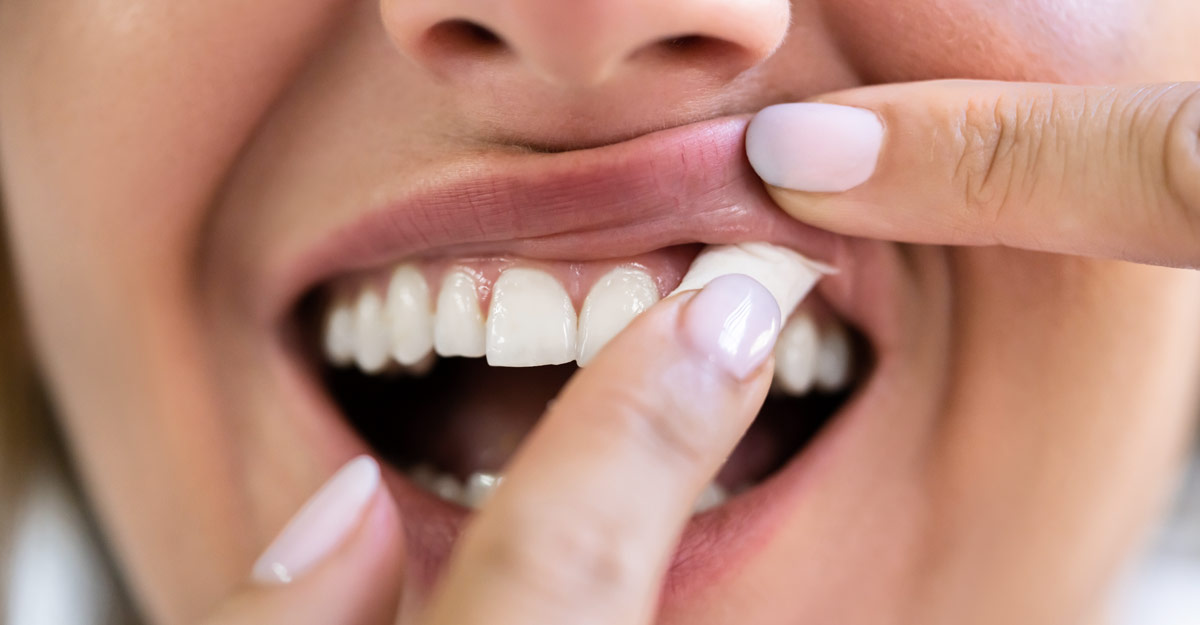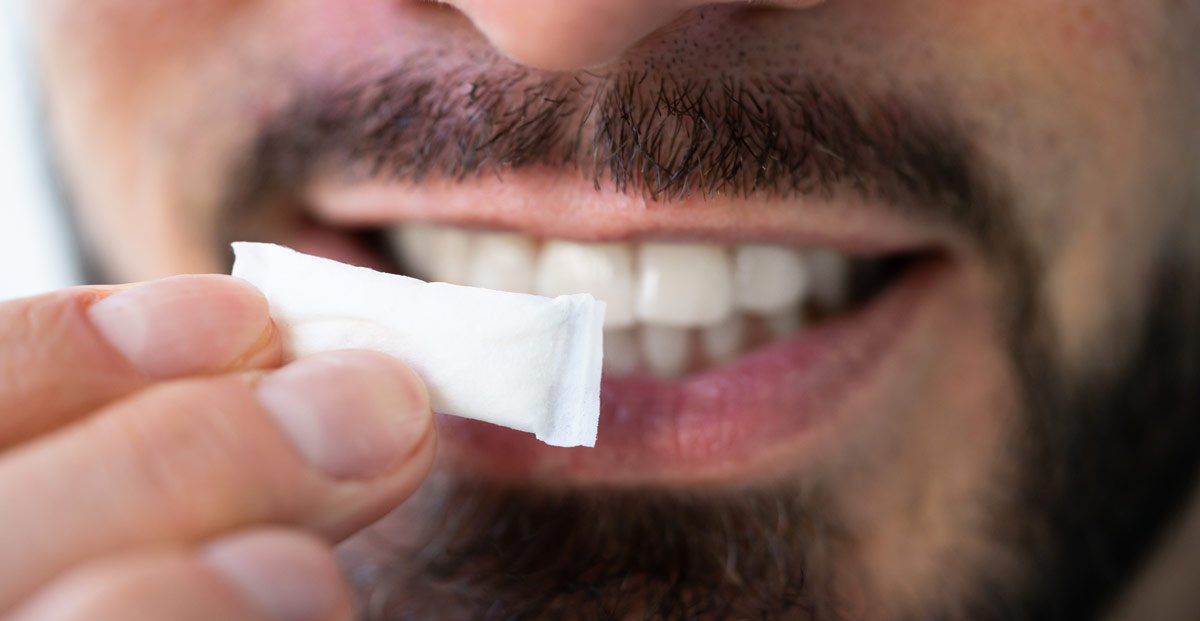Tobacco alternatives like nicotine pouches are becoming increasingly popular among existing adult smokers looking for a less harmful alternative to traditional tobacco products. While a nic pouch can be a convenient way to enjoy nicotine without producing smoke, many people are now questioning the dental health implications of these smoke-free products.
Tobacco has long been associated with serious dental issues including staining, gum disease and tooth loss. With nic pouches marketed as completely tobacco-free and smoke-free, many users assume they are a safer choice for oral health.
But could switching from smoking cigarettes to tobacco-free pouches benefit your smile? Or are we trading one harmful alternative for another? Let’s explore the real cost of these modern nicotine products on your teeth and gums.
What are nicotine pouches?
How they work and what they contain
Nicotine pouches are small white pouches that are placed in the upper lip, where nicotine is absorbed through the gum.
Unlike traditional snus or chewing tobacco, they do not contain tobacco leaf or powder from the tobacco plant. Instead, they use synthetic or extracted nicotine combined with plant-based fibres, sweeteners and flavourings.
These nicotine pouches are designed to deliver a satisfying nicotine experience without producing smoke or requiring any special devices.
Many top brands offer various flavours and nicotine strengths, from mild options suitable for beginners to strong nicotine pouches aimed at experienced users with higher nicotine requirements. You can also find slim pouches that fit discreetly and comfortably under the lip.
Key differences from traditional smoking and vaping
The main difference between using a nic pouch and smoking cigarettes is the method of nicotine delivery.
Smoking relies on inhaling cigarette smoke, which carries not only nicotine but also hundreds of harmful chemicals. Nicotine pouches, on the other hand, do not produce smoke or vapour. They are a convenient way to satisfy nicotine cravings without affecting others nearby.
Compared to vaping products, nicotine pouches are even more discreet and require no charging, refilling or maintenance. You simply pop a pouch in your top lip and enjoy the nicotine release. They are also suitable for public transport, offices and other smoke-free environments.
Tobacco and your teeth: the known risks
Gum disease and tooth loss
Smoking cigarettes is well known for its destructive impact on oral health. It restricts blood flow to the gum tissue, making it harder for your mouth to fight infections and heal. Over time, smokers face a much higher risk of gum disease, receding gums and eventual tooth loss.
The presence of nicotine further complicates things by constricting blood vessels, weakening the body’s ability to respond to oral bacteria. This leads to deeper gum pockets, inflammation and a faster progression of periodontal disease compared to non-smokers.
Staining, bad breath and more
One of the most visible consequences of smoking is stained teeth. Tar and other chemicals in cigarette smoke cling to tooth enamel, creating a yellow or brown tint that can be hard to remove. Smoking also dries out the mouth, reducing saliva production and contributing to persistent bad breath.
Over time, it can also affect your sense of taste and cause changes in the tissues inside the mouth.
Smoking vs nicotine pouches: oral health comparison
Effects on the gums and enamel
Nicotine pouches, although completely free from tobacco, are not entirely risk-free for oral health. Since they are placed in direct contact with the top lip and gum area, frequent use can lead to localised irritation. Some users report a tingling sensation, soreness or gum recession in the spot where the pouch is consistently placed.
On the positive side, nicotine pouches do not stain teeth like cigarettes do, and they do not produce the acidic by-products of combustion that weaken enamel. This makes them a potentially less harmful alternative to traditional tobacco products, especially when used responsibly.
Impact on saliva production and pH levels
Nicotine, regardless of the source, can reduce saliva flow. A dry mouth environment is more susceptible to plaque buildup, cavities and gum problems. Some pouch ingredients and certain nicotine pouch flavours may also affect the pH balance of your mouth, creating conditions that favour bacterial growth.
Swapping smoking cigarettes for nicotine pouches may reduce some risks, but it is still important to maintain good hydration and oral hygiene when using any nicotine products.
Beyond pouches: other tobacco alternatives
Vapes, heated tobacco and snus
In addition to nicotine pouches, there are several other tobacco alternatives on the market. Vaping products have grown in popularity, offering a vapour-based way to consume nicotine via e-cigarettes. Heated tobacco products work by warming tobacco rather than burning it, reducing exposure to some harmful substances.
Traditional snus, often confused with nicotine pouches, is a moist oral product that does contain tobacco. It is placed in the upper lip like a pouch, but the presence of tobacco increases the risk of gum irritation, discolouration and soft tissue changes.
Comparing the dental effects of each option
Compared to chewing tobacco or traditional snus, tobacco-free nicotine pouches are likely to be gentler on the mouth. The absence of tobacco makes them less abrasive and less likely to cause long-term gum damage.
However, how you use nicotine pouches matters. Prolonged use of strong nicotine products in one area of the lip may still cause damage, especially without rotating placement.
Long-term use: what we know (and don’t know)
Research on prolonged nicotine pouch use
Because nicotine pouches are still relatively new in the UK, long-term studies on their oral health effects are limited. Early evidence suggests they carry fewer risks than smoking cigarettes or using traditional oral tobacco products, but any form of nicotine delivery that comes into contact with the mouth may lead to localised issues.
Regular users should monitor their lip and gum health closely and take steps to reduce potential harm by adjusting how and where they place the pouch.
Unknowns and emerging studies in the UK
Ongoing research is starting to explore how different pouch materials, flavours, and nicotine strengths affect the soft tissues of the mouth. Some pouch designs may cause more irritation than others, and repeated use in the same area could lead to chronic issues.
As new findings emerge, users should stay informed and seek guidance from dental professionals.
Vaping, chewing tobacco and dual use
How they rank in oral health impact
When comparing different nicotine delivery systems, chewing tobacco and traditional snus carry the highest oral health risks. Both contain tobacco and involve prolonged contact with the gum, increasing the likelihood of damage and oral cancers.
Vaping products vary widely depending on the ingredients and devices used. While they may avoid some of the risks of smoking, they still have the potential to dry out the mouth and irritate soft tissue.
Nicotine pouches, being completely free of tobacco, generally rank lower on the risk scale. However, they are not entirely without side effects, especially when used excessively or without attention to oral hygiene.
Risks of using multiple nicotine products
Using more than one nicotine product at a time can increase your total nicotine intake and put extra stress on your mouth.
For example, someone who vapes and uses pouches may experience greater irritation, dryness and nicotine dependence. It is always best to use one product at a time and monitor your mouth for any signs of discomfort or damage.
Spotting the signs of damage early
Symptoms to watch out for in your mouth
If you regularly use nicotine pouches, it is important to keep a close eye on any changes in your mouth. Early symptoms of irritation or damage can include redness, soreness, and sensitivity where the pouch rests against the upper lip. You might also notice a tingling sensation, a slight swelling, or even a loss of gum tissue in that area.
In some cases, prolonged use in one spot can lead to gum recession. This occurs when the gum starts to pull back from the tooth, exposing more of the tooth root and increasing the risk of sensitivity or decay. Even if the product is completely tobacco-free, the nicotine and pressure of the pouch can still have an impact on soft tissue over time.
Discolouration, white patches, or a burning feeling in the mouth should also not be ignored. These may indicate irritation or a reaction to the ingredients in the pouch. It is best to rotate pouch placement to avoid overusing a single spot in your mouth.
When to see a dentist for nicotine-related issues
Routine dental check-ups are essential for anyone who uses nicotine products. Whether you are using popular nicotine pouches or experimenting with other tobacco alternatives, it is helpful to let your dentist know.
Being honest about your habits allows your dentist to check for signs of damage specific to your lifestyle, such as recession, irritation, or soft tissue changes in your lip and gum.
Dentists can also offer tailored advice, such as recommending softer pouch materials or advising you on how to reduce the risk of irritation.
If you experience bleeding gums, chronic sensitivity, or ulcers that do not heal, you should book an appointment immediately. Early treatment can prevent more serious oral health issues from developing.
Caring for your smile while using nicotine
Practical dental hygiene tips
Good dental hygiene becomes even more important when using nicotine products. Brushing twice a day with fluoride toothpaste is the first step to keeping your teeth and gums healthy. Do not forget to floss daily, as plaque between the teeth can contribute to gum problems that may be worsened by nicotine use.
After using a nicotine pouch, rinsing your mouth with water can help reduce acidity and wash away any residue. You might also consider sugar-free gum to increase saliva production, which plays a key role in protecting the mouth from bacteria and decay. Saliva helps to neutralise acids and keep your mouth fresh between brushing.
It is also wise to avoid placing pouches in the same spot on your top lip every time. Rotate positions to give your gums a chance to recover. Choose products that suit your needs without being too strong, especially if you are not an experienced user.
Products and practices that can help
To support your oral health, look for toothpaste and mouthwash designed specifically for gum care.
Some products are formulated to reduce inflammation and strengthen sensitive areas of the gum line. If you are using strong nicotine pouches, it may be beneficial to opt for smaller pouches or those with a lower nicotine strength to reduce intensity and exposure time.
Top brands often provide a wide range of pouch types, including slim pouches and ones made with softer fibres. This can reduce friction against the gum and provide a more comfortable experience. Other brands may not meet the same standards, so it pays to research which manufacturers offer great customer service and quality control.
If you are new to using nicotine pouches, experiment with various flavours and pouch types to find the best fit. Your perfect pouch should be effective for your nicotine cravings while still being gentle on your mouth.
Fulham Road Dental: helping you protect your smile while using nicotine pouches
As dental professionals, we understand the growing interest in nicotine pouches among adults seeking a smoke-free and tobacco-free alternative to traditional tobacco products. However, while they eliminate many of the dangers associated with smoking cigarettes, they are not entirely risk-free when it comes to your oral health.
At Fulham Road Dental, our hygienist appointments are tailored to help maintain your oral health, particularly if you use nicotine products. Our comprehensive hygiene treatments include ultrasonic cleaning, polishing for deep stain removal, and bespoke oral hygiene advice to support long-term gum health.
If you are currently using nicotine pouches or considering them as an alternative to smoking, we encourage you to speak to our team. We can offer personalised guidance to help you protect your teeth and gums while managing your nicotine intake in a way that supports your overall wellbeing.
Your smile deserves professional care, no matter your lifestyle choice – book your appointment with us today!




